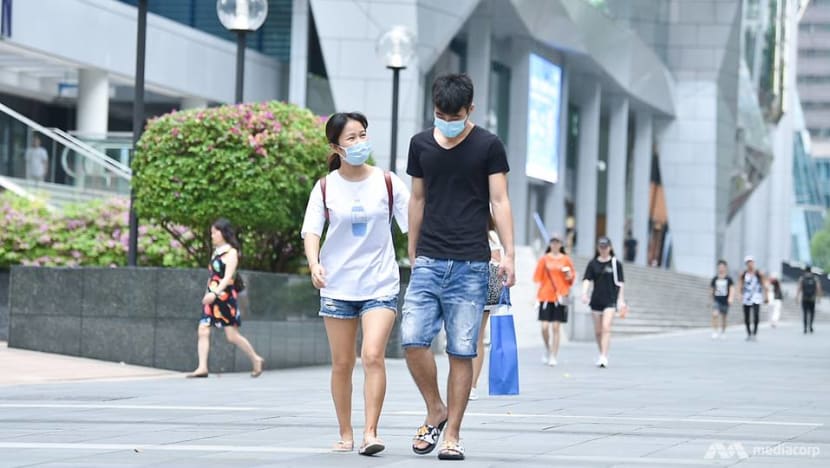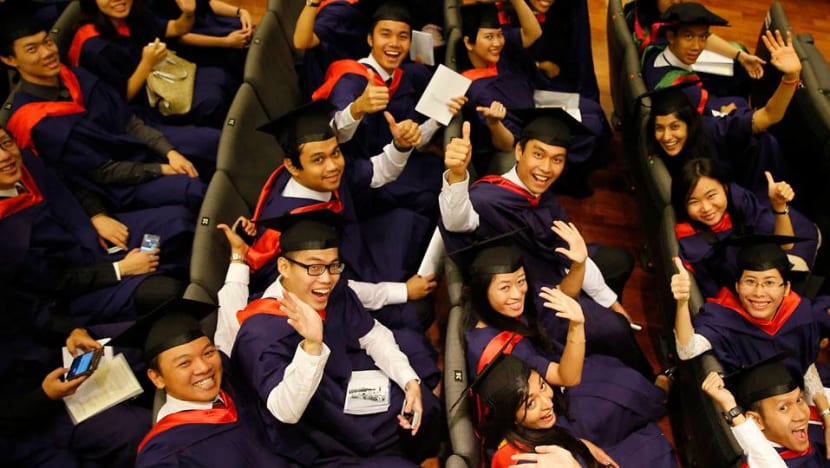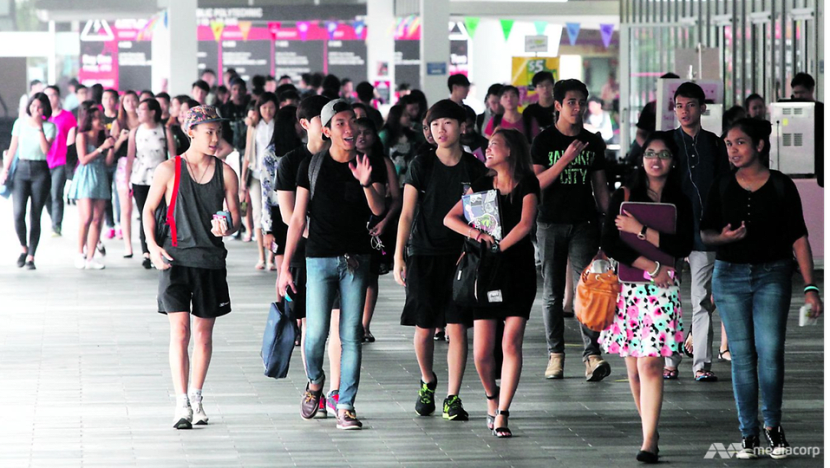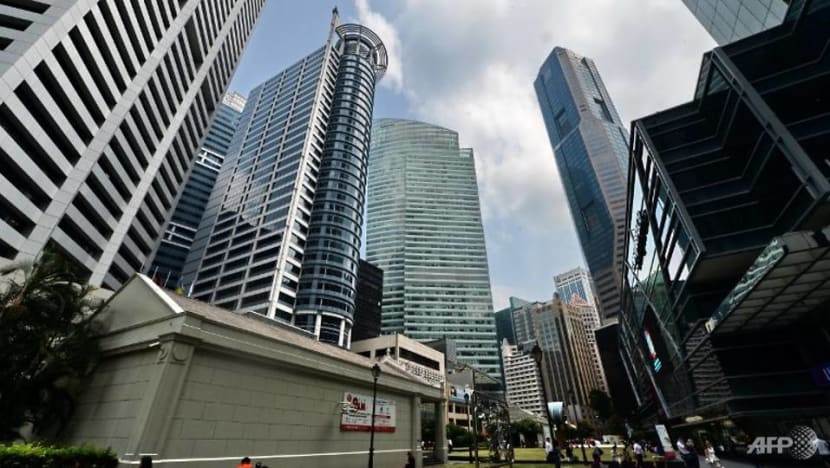commentary Commentary
Commentary: No ordinary disruption – a rising generation meets the coronavirus
Facing extraordinary disruption, Singapore students in higher education may view the future with pessimism but this COVID-19 outbreak presents a chance for us to take back the narrative, says Ng Chia Wee.

People are seen wearing protective face masks at Orchard Road, Singapore on Mar 11. (Photo: Gaya Chandramohan)
SINGAPORE: “An unprecedented crisis” – those were the words of National Development Minister Lawrence Wong, who co-chairs Singapore’s COVID-19 taskforce, in announcing tighter border restrictions to combat the coronavirus outbreak on Sunday (Mar 22).
An unprecedented crisis, the ongoing global pandemic has changed all our lives. And among those who have felt the brunt of the rush to contain COVID-19, are students in higher education all across the world.
At home, the Ministry of Education on Mar 15 announced a recall of students on official overseas placements, including all internships and exchange programmes. In addition, institutes of higher learning will suspend all overseas placements until the end of July.
Relatedly, Singaporean students studying overseas have been encouraged to return home soon, with the Government liaising with airlines to facilitate return flights.
Meanwhile, Singaporean students studying locally have had to rapidly adjust to new academic arrangements, whilst dealing with a suspension of their planned trajectories for 2020 and possibly beyond.
READ: Commentary: How prepared are parents for suspension of schools if that happens?
READ: Commentary: The ways in which the COVID-19 pandemic could unfold
As it becomes increasingly clear that the COVID-19 outbreak will last a year, even more, a difficult realisation is starting to dawn for my generation of youth: This is only the beginning. To borrow the title of a 2014 book associated with the McKinsey Global Institute, this is no ordinary disruption.
NO ORDINARY DISRUPTION
On the economic front, a brewing economic storm will likely cause tightened hiring and reduced job vacancies, carrying the prospect of underemployment fresh out of graduation.
Internships will also be in shorter supply, while competition rises due to higher demand from returning students and students whose summer overseas placements have been suspended. The risk of a gap in one’s resume looms.
Furthermore, most major events that make for prime networking events for graduating students will likely be cancelled for the foreseeable future. Increasingly stringent social distancing measures will inevitably disrupt the activities of social causes that define this generation; even one’s social life will likely take a hit.

Less tangibly, significant milestones such as commencement and graduation trips will never materialise in the ways they were supposed to, the finishing line of a decades-long race suddenly disappearing just as one approaches.
Against the backdrop of an already uncertain future stemming from technological changes and trade tensions, the changes brought about by the coronavirus add up.
Day by day, they add up to a gradual, persistent disruption of previously planned rising trajectories – there’s no denying that the world has been dealt a bad hand.
A once-familiar equilibrium has been disturbed, and the race is on for students, graduates and workers to quickly find a new one, to regain control over our plans and lived experiences.
THE FIGHT FOR CONTROL
It is here that I must switch to the first-person, “I”, for the above was a product of intensely personal reflection over the past few weeks, as I felt many familiar routines slipping away and a gradual erosion of my plans for the year.
READ: Commentary: Why Singapore is preparing to tap the brakes to slow COVID-19 spread
READ: Commentary: Why Singapore is better prepared to handle COVID-19 than SARS
The late economic historian Peter L Bernstein wrote: “The ability to define what may happen in the future and to choose among alternatives lies at the heart of contemporary societies."
Choice, preparedness, control – a global pandemic seems to challenge all these. It emerged from nowhere, and now that it’s here, it is easy to feel somewhat lost, vulnerable and strung along through the days.
How does one regain that sense of control? I have three pieces of advice for all my peers reading this, wondering about their disrupted futures in a time of coronavirus.
First, switch from being reactive to being proactive.

The reason why I felt “strung along” was because I was constantly reacting to what the COVID-19 situation threw at me; I was not in control of the narrative. What I needed to do was to get ahead of developments, to take back control by finding a new destination to head to when the route to old ones now seem increasingly murky.
So I decided that I would finally pursue a dream of mine of writing a book about writing skills for young adults.
Embarking on this project will allow me to take back the wheel in my 2020 journey. Plus, should I decide to take on a writing-related or research career in future, this could stand me in good stead.
The question you should ask is: What is something that I have always wanted to do, but have never been able to as I was always too busy? It need not be career-related, but if it is, a second piece of advice is in order.
READ: Commentary: How to sabotage your child’s future – five dangerous notions about life, careers and education
READ: Commentary: Don’t waste Budget money. Here’s how to stretch your SkillsFuture dollars
The second piece of advice is this: Focus not on getting through this “downturn”, but being ready to ride the upturn when it comes.
If such language seems familiar, it’s because Deputy Prime Minister and Finance Minister Heng Swee Keat used it in his Budget 2020 speech.
One month on, the phrase that stuck with me most from Mr Heng’s speech is “when the upturn comes”.
The exact sentence was: “We want to help our workers retain their jobs, and use any lull period to upgrade their skills, and be ready when the upturn comes.”
That sentence was about workers, but it equally applies to those of us who are still studying and have yet to enter the workforce. This lull period is an opportune time to plug skill gaps that may limit the attractiveness of potential job applications and to seek out mentorship on how to improve ourselves.
We could research and be more in tune with emerging trends in the job market which will come to bear when the upturn comes.
More radically, in this lull period, we have the capacity to take a good hard look at where we are heading professionally, and ask if that is where we truly want to go. We can then make necessary adjustments to our planned trajectories which we can realise once the upturn arrives.
AND NOW, A TWIST
Underlying these two pieces of advice is a call to do something you may not have normally done. Will this guarantee that things will work out for the best in the end? Of course not.

The final piece of advice is thus one of mindset – be ready to take a risk.
Here’s a twist: The quote from Peter L Bernstein which sparked this discussion was from a book titled Against The Gods: The Remarkable Story Of Risk.
According to Bernstein, the word “risk” comes from the early Italian word risicare, meaning “to dare”.
To be proactive, and to be ready for the upturn, we must dare to do what we typically might not have considered, explore potential new paths, seek out opportunities in industries beyond those we originally set our sights on, collaborate with others to work on novel projects and start new initiatives.
Think of it this way: We already have nothing to lose, and thus, everything to gain.
No matter what, of course, there is no denying that an unprecedented crisis dealt us a bad hand. This wasn’t what we planned for, this wasn’t what we wanted.
But make no mistake, whether we’re studying, about to graduate, or in the job market, we can retake the wheel; we can regain control; we have agency.
And perhaps, if we play our cards right, we can also make this an unprecedented opportunity.
BOOKMARK THIS: Our comprehensive coverage of the novel coronavirus and its developments
Download our app or subscribe to our Telegram channel for the latest updates on the coronavirus outbreak: https://cna.asia/telegram
Ng Chia Wee is a second-year student at the National University of Singapore’s Faculty of Arts and Social Sciences and Tembusu College. He is also part of Access, a social mobility non-profit organisation.














